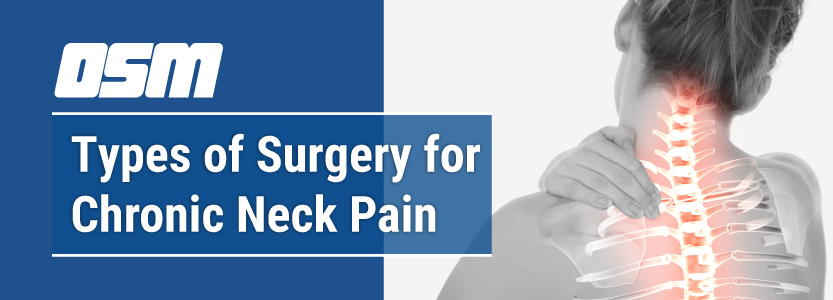Types of Surgery for Chronic Neck Pain
Article featured on Arkansas Surgical Hospital
Chronic neck pain can be debilitating, interfering with your ability to work and enjoy life to the fullest. If conservative treatments haven’t helped relieve your symptoms, it may be time to consider surgery.
What Conditions Need Neck Surgery?
There are several conditions that cause chronic neck pain that my require surgery. Some of the most common include:
- A pinched nerve (cervical radiculopathy). When the vertebrae in the neck become compressed, they can pinch or irritate the spinal cord, causing pain, weakness, or numbness.
- A herniated disc. This occurs when there is a tear in one of the discs between two vertebrae and it bulges out into the spinal canal, pressing on nerves and causing pain, tingling, and numbness.
- Spinal cord compression (cervical myelopathy). The spinal cord becomes compressed by pressure from swelling, bone spurs, or tumors near the base of the skull. If untreated, it can cause permanent paralysis and loss of sensation in the arms or legs.
- A broken neck (cervical fracture). This injury often results from a direct blow to the front of the head during contact sports or from a car accident.
Surgery for Chronic Neck Pain
If you’re experiencing chronic neck pain, you should consider all your treatment options before deciding whether or not surgery is for you. However, with so many surgical procedures available today, your doctor can recommend which one will work best for you.
Here are some of the most common types of surgery performed on patients with chronic neck pain and what each of them does to help reduce symptoms in your body.
Cervical Spinal Fusion
One type of surgery that may be recommended for chronic neck pain is cervical spinal fusion. This is a procedure where the surgeon fuses, or joins, two or more vertebrae in the neck. This can help to stabilize the spine and relieve pain.
The surgeon makes an incision in the front of the neck and carefully detaches the muscles and other tissues from the vertebrae. The surgeon will then position the vertebrae so they can be fused together.
Anterior Cervical Discectomy & Fusion (ACDF)
ACDF is usually performed when symptoms are caused by two or more cervical discs that have ruptured and/or herniated simultaneously. In this procedure, the surgeon accesses the spine through an incision in the front of the neck. The damaged disc is removed and replaced with a bone graft. Metal screws and plates are used to fuse the vertebrae, providing stability to the spine.
Laminectomy
Also known as decompressive surgery, a laminectomy is a type of spinal surgery that involves removing a small section of bone (the lamina) to relieve pressure on the spinal cord or nerves. It’s used in cases where there is compression, irritation, and inflammation of the nerve roots or spinal cord due to injury, herniated discs, or narrowing of the spinal canal.
Artificial Disc Replacement (ADR)
ADR involves replacing the damaged disc with an artificial one. It has several benefits, including improved range of motion, decreased pain, and improved quality of life. In addition, it is considered a less invasive option than other types of neck surgery.
Posterior Cervical Laminoforaminotomy
A posterior cervical laminoforaminotomy involves removing a small section of bone and tissue in the back of the neck to take pressure off the spinal cord and nerves. It is considered a fairly invasive procedure because it requires breaking through bone, but many people find it effective in alleviating chronic neck pain.
Recovery from Neck Surgery
Most people who have surgery for chronic neck pain recover well and can return to their normal activities within a few months. However, following all your surgeon’s instructions and attending all follow-up appointments is important to ensure a successful recovery.
You should not start any strenuous activity until you can do so without feeling sore or experiencing any other discomfort. As your body heals, you may need to modify some daily activities to reduce the risk of re-injury. Be sure to follow your surgeon’s advice because it will be tailored specifically to your situation.
Factors to Consider
If you are considering surgery for your chronic neck pain, discuss all the risks and benefits with your doctor. While several surgical options are available to treat chronic neck pain, the type of surgery your doctor recommends will depend on the underlying cause. Surgery is typically only recommended if other conservative treatment options have failed.
Additional factors that your doctor will consider include whether there is muscle weakness in addition to pain or if other areas of your body are affected. They will also look at your overall health and any other issues you may face. For example, if you have diabetes, it could impact which treatment option is recommended. If you’re obese, smoking tobacco, or taking certain medications, these factors can also impact treatment recommendations.
The Orthopedic & Sports Medicine Center of Oregon is an award-winning, board-certified orthopedic group located in downtown Portland Oregon. We utilize both surgical and nonsurgical means to treat musculoskeletal trauma, spine diseases, foot and ankle conditions, sports injuries, degenerative diseases, infections, tumors and congenital disorders.
Our mission is to return our patients back to pain-free mobility and full strength as quickly and painlessly as possible using both surgical and non-surgical orthopedic procedures.
Our expert physicians provide leading-edge, comprehensive care in the diagnosis and treatment of orthopedic conditions, including total joint replacement and sports medicine. We apply the latest state-of-the-art techniques in order to return our patients to their active lifestyle.
If you’re looking for compassionate, expert orthopedic and podiatric surgeons in Portland Oregon, contact OSM today.
Phone:
Address
17355 Lower Boones Ferry Rd Suite 100A
Lake Oswego, OR 97035
Hours
Monday–Friday
8:00am – 4:30pm



